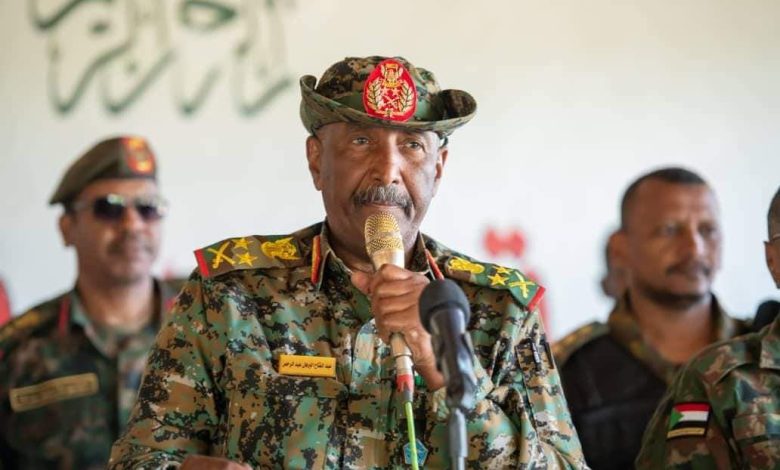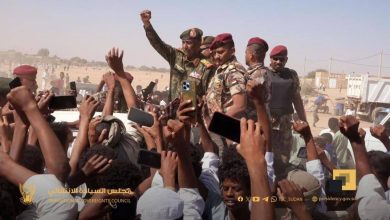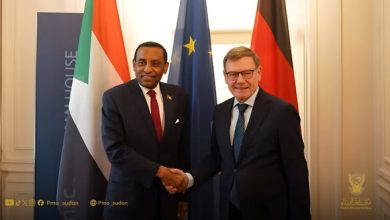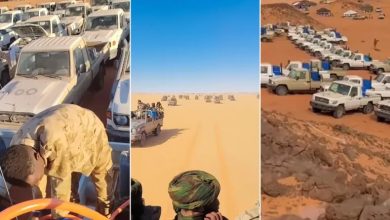Messages of Al-Burhan …When the Army commander Raises his Index Finger!

Report – Abdul Basset Idris
From an open popular space and outside the fortified strongholds of the army, the head of the Sovereign Council and the army commander, Lieutenant General Abdul Fattah Al-Burhan, closed the door against any possible settlement that carried external shadows that would keep the Rapid Support Forces (RSF) militia within the political and military scenes. So what prompted the general to send this message with all this clarity at this time?!
What did Al-Burhan say:?!
Al-Burhan said that this war will end in favor of the victory of the Sudanese army and people, and behind them the other regular forces, the Mobilized, and the popular resistance.
In this direction, he emphasized the ability of the people and their army to defeat the rebellion and defeat what he called (the Janjaweed) and (the mercenaries).
Al-Burhan stressed that there will not be any talk until after the end of the battle and that they will not hand over the state to any internal or external party, and he reinforced his speech in this regard with a phrase worth considering, which is (No one can intimidate or subdue us).
The significance of the place
Before searching for what is behind Al-Burhan’s speech and the address to which it was sent, it is worth noting the place of his speech, which the man appears to have chosen carefully to link his speech and messages to the course of the battle and the conditions on the field. He chose the village of Umm Shajara in the Gedaref countryside, to demonstrate several things, the most important of which is that he is interested in the voice of the Sudanese people and is aware of their suffering and demands. At the same time, he does not ignore the forces of the countryside and villages that are most affected and exposed to the violations of the rebel militia, in addition to emphasizing that the army has the initiative and is still spreading its hands over a wider area and that it is at its best structural and leadership cohesion and is still at its best in terms of its combat arsenal and its human and intelligence capabilities. His movements as army commander between cities, villages, and theaters of operations are only a practical translation of his ability to establish command and control and move forces in “deed”, not in “words”, to the second and final phase of the war, and that talk about the rebel’s combat capabilities are pure lies.
Those concerned with the message:
Although Al-Burhan’s speech in Umm Shajara included many sources and sayings, it seems that he deliberately placed a specific message in the mail of external parties, and this is evident in his emphasis on not handing over the country to external or internal parties and that there should be no talk until after the battle is over, and in defiance he said that this battle will end by defeating the rebellion and the mercenaries and in favor of the victory of the army and the people, and it seems that Al-Burhan, and behind him the military establishment, have despaired of the results of unannounced and very secret consultations with some external parties influencing the course of the war, specifically those supporting the rebellion, with whom the army may have communicated in the context of a systematic approach. The army sought to contain the crisis, by trying to identify the intentions or concerns of external parties to deal with it according to the data of its adequate management of the war and the importance of emerging from it victorious. It also appears that the military negotiator or the sovereign delegations have received conditions that may be harsh or unfair to the country and humiliating to the people, so Al-Burhan has the effect of rejecting them. Publicly, at a level that was perhaps more cruel and higher than the level of ugliness with which they were met with these conditions by the external parties fueling the war through financial and military support for the militia.
However, you find within the context of Al-Burhan’s speech his confirmation to the outside world that supports the continuation of the war, that he is able to understand well their fears and concerns. They will be welcomed into cooperative relations based on sound foundations that will find encouragement and protection from official state institutions within a comprehensive vision that takes into account the country’s vital interests, especially those closely related to national security issues. However, at the same time, he refuses, as commander of the army and president of the sovereign authority, to hand over the country and its army to some international powers to manage the affairs of the country. His citizens, and the most important thing to say about this is that the country, its people and army, should allow or accept some external parties using the rebel militia as a riding horse to achieve its internal agenda through desperate attempts to revive it and keep it within the country’s political and security system.
olitical analyst Ibrahim Yassin says to (Sudan Events) that Al-Burhan recently realized the popular and military position that strongly refuses to go to any talks that result in an agreement that maintains the rebel militia. Yassin points out that Al-Burhan is still subject to many and varied external pressures to restore the situation in a way that allows the preservation of a modified version of the RSF militia, and noted the many attempts made in this context to rescue Hemedti’s forces from the Jeddah Agreement and try to exit it and the resulting commitments to a new negotiating platform.
On the other hand, Yassin says that Al-Burhan will lose his sovereign and military positions if the desire of the Sudanese people to eliminate the militia and restore security and stability goes against him.
Al-Burhan alternatives:
If this is Al-Burhan’s position, what are his alternatives and options for the post-war period?
The military expert, (R) Major General Al-Tayeb Mukhtar, answers to (Sudan Events) the question by saying: Al-Burhan and the army will not be able to confront external ambitions without working to unify the internal front and mobilize it towards fighting the battle and modifying the military scene on the ground by defeating the RSF militia and eliminating any hope for any state to attack Sudan through this militia, which has given the Sudanese people a hard time. Major General Mukhtar suggested that the army shall remain in the national scene in a more powerful and decisive manner in order to restore many matters to their proper place.



